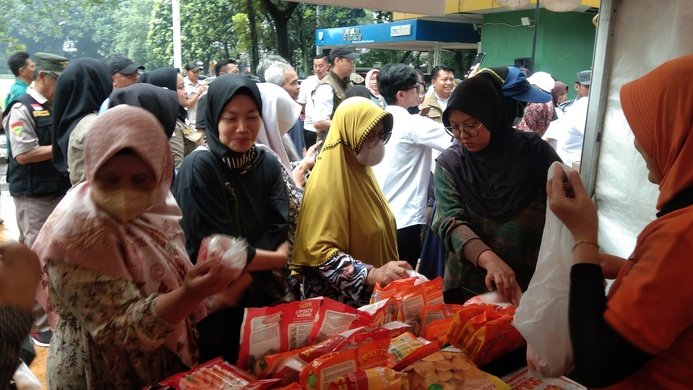The city of Bandung continues to implement specific programs to stabilize the local economy ahead of Eid al-Adha 2025. The mayor highlighted three strategic initiatives currently in place, directly addressing residents’ needs—from food price control and animal health to job availability.
One of the notable programs is the «Cheap Bazaar,» running for ten consecutive days across 30 districts, with three different locations hosting the event daily. Beyond curbing rising food prices, the bazaar also serves as a platform for cooperatives and small-to-medium enterprises (SMEs) to expand their market reach and boost sales.
«It takes place in three districts each day, providing SMEs with an opportunity to increase their revenue,» the mayor stated during a meeting.
In addition to basic necessities, the city anticipates high demand for sacrificial animals ahead of Eid al-Adha. Health inspections for these animals began in early June, with QR codes attached to those cleared. This innovation allows residents to digitally verify an animal’s health history before purchase.
So far, no cases of foot-and-mouth disease (FMD) have been detected in Bandung. However, residents are urged to remain cautious and buy only from verified sources.
«There have been no reports of FMD yet, but purchases are being restrained. Typically, a surge in cases occurs three days before Eid al-Adha,» the mayor explained.
Meanwhile, to address persistent unemployment, the city plans to hold an open job fair targeting various productive age groups. The mayor acknowledged challenges, such as limited private-sector job openings, but assured that the government is actively working on solutions.
As a short-term measure, Bandung continues its labor-intensive program, now in its third cycle. This initiative employs local workers for light infrastructure and social projects, serving as temporary relief while broader labor market improvements are pursued.
«Many companies haven’t opened vacancies yet, so the labor-intensive program remains a key solution,» the mayor said.
Through these three strategies—price stabilization via the Cheap Bazaar, animal health assurance, and job creation through labor programs—Bandung’s government demonstrates its commitment to tackling economic challenges comprehensively.

The Subang Regent has secured approval from the West Java Governor and the Ministry of Home Affairs to implement bureaucratic reforms in the region. He emphasized a zero-tolerance policy toward indiscipline, even if violators are close relatives.
«I have the governor’s and ministry’s approval. I will be firm, even if the undisciplined civil servant is my own sibling,» he declared during a staff briefing.
He stressed that bureaucratic reform cannot be achieved alone, so district heads and local leaders were invited to ensure objectivity in the process.
«I need everyone’s cooperation. For instance, diligent employees unfamiliar with technology should receive support, while absentees must face consequences. This ensures fairness, eliminating favoritism,» he added.
The Regent confirmed that 10 civil servants will be dismissed for violating established rules, proving the reform’s seriousness.
«An ASN absent for 28 days a year without justification—or 10 consecutive days—can be dismissed. This is not a bluff,» he stated.
He urged all Subang residents to participate in improving public services, emphasizing swift responses to complaints submitted via social media.
«I document and address public complaints daily. Subang must respond quickly and deliver efficient services,» he said.
Alongside penalties for poor performance, the regency will introduce rewards for outstanding civil servants.
«Deductions from latecomers’ benefits will be allocated to those working extra hours,» he noted.
Finally, the Regent emphasized that every rupiah spent on salaries must yield tangible public benefits.
«Funds allocated for wages must produce clear outcomes,» he concluded.
The briefing was attended by regional assistants, department heads, and district leaders






